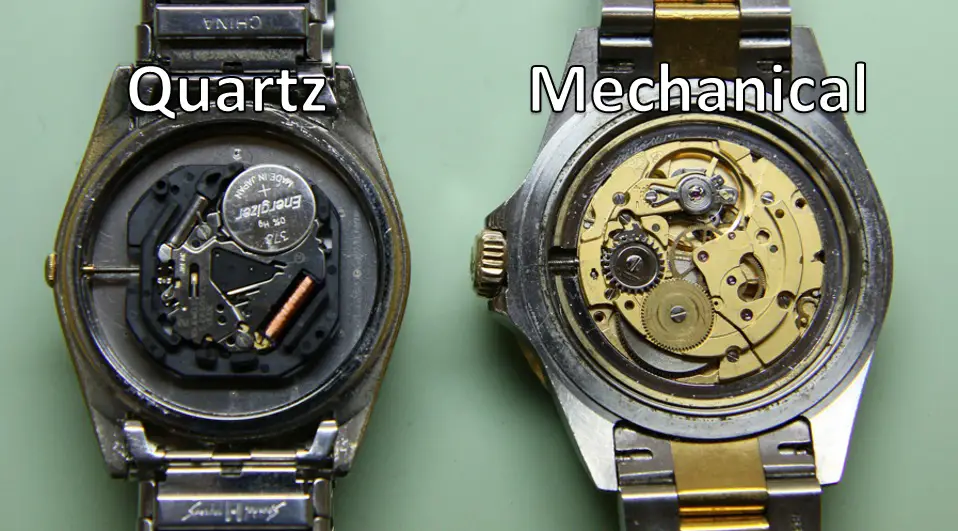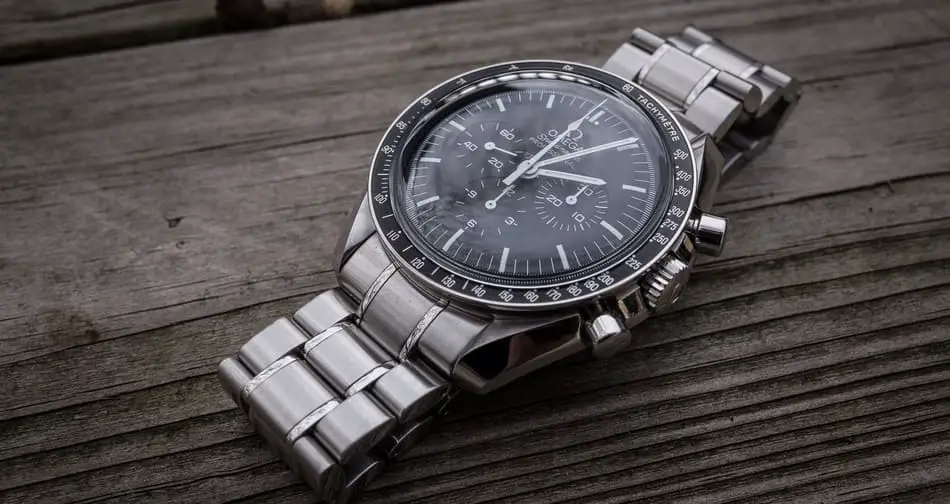So you have probably come to the crossroad of choosing between a mechanical watch and a quartz watch. Although there is no definite answer to which is better overall because they each have their own unique selling point and you will find all about it in this article.
So, why are mechanical watches better than quartz watches? Unlike a quartz watch, mechanical watches have no battery, microchip, or electrical circuitry. Components in a mechanical watch are crafted to near perfection and of the highest quality at microscopic sizes and assembled by hand to be able to withstand the passage of time.
This is a common question that many people have, the dilemma of getting a mechanical or a quartz watch can be difficult.
There isn’t a short answer to this question, but I have broken the information down to help you understand why mechanical watches are better.
Why are mechanical watches better than quartz? Here are the top 5 reasons:
- Lifespan
- Value appreciation
- Quality
- Second-hand motion
- Craftsmanship
Now that you know mechanical watches are better due to the reasons stated above, we will be going through each of these reasons to find out whether if you agree with us.
1) Life Span – How Long do Mechanical Watches Last?
Mechanical watches can easily last more than a lifetime as the components that are used to build mechanical watches are often the highest quality. Whereas, quartz watches are mostly mass-manufactured with the cheapest possible parts and usually last no more than a decade.
| Mechanical Watches | Quartz Watches | |
| Components | High-quality, gears and springs | Low-quality, electrical chips |
| Degrades | No, if maintained well | Yes. electronics degrades |
| Lifespan | Over 100 years | 10 years at most |
| Repair/Restoration | Yes | Difficult, replacing is cheaper |
Over the years, I hardly see a quartz watch that is more than a decade old, let alone an antique watch. On the contrary, mechanical watches of over 30, 50, and even 70 years are always available. However, mechanical watches do require regular servicing to keep it running over many years.
I guess we can conclude that only time can tell how durable a watch is, and the answer is pretty clear.
2) Value Appreciation – Do Mechanical Watches Hold Their Value?
One common trend can be seen throughout the history of auctions and resale of old mechanical watches, and that is the increased value of these mechanical watches. Undoubtedly, mechanical watches do hold strong value retention and are likely profitable investments.
In 2005, I bought a Rolex Submariner for about $4,700 and sold it 12 years later for $13,750 at an auction. Examples of how mechanical watches appreciate over time are common.
Mechanical watches are crafted through pure physics and ingenuity. Even a simple mechanical watch without complications consists of about 130 to 150 parts. Carefully assembled by the watch smiths, each of these components is interlinked with the others to keep the watch running.
Comparing the back of the quartz watch against a mechanical watch. You can see the difference and appreciate the mechanical watch for its complexity and design. I don’t think this requires any more emphasis or further explanation of why the mechanical watch can hold its value so well.

3) Quality – Are mechanical watches really good?
Did you know that historically, mechanical watches were only available to the upper class?
Mechanical watches in Switzerland were considered high-end luxury goods. And when the price was not a factor in production, it steered the Swiss watch-making industry to only focus on the best materials to create flawless craftsmanship on its mechanical watches.
Hence, without a doubt, mechanical watches are mostly built with the highest quality alongside with fine craftsmanship.
4) Second-Hand Motion – Do All Watches Tick?

Only quartz watches tick at every second. An easy way to identify a mechanical watch from a quartz watch is by the second-hand of the watch. On a mechanical watch, the second-hand has a smooth sweeping motion, while on a quartz watch, the second-hand ticks once per second. Above is a clear illustration of the two.
Here’s a quick recap of what we have covered so far:
| Mechanical Watches | Quartz Watches | |
| Lifespan | Over 100 years | 10 years at most |
| Value appreciation | Increase | Decrease |
| Quality | High | Low |
| Social Status | High | Low |
| Second Hand Motion | Smooth motion | Ticks once per second |
5) Craftsmanship – What Your Watch Says About Your Social Status
Wait! Can a watch indicate social status? That’s right!
In today’s context, social status, which is also known as social standing, is the relative respect you will get from others. It’s often subtle and unconscious but has far-reaching effects.
Wearing my favorite Omega Speedmaster Mechanical grabs the attention of people, often leaving a better impression. The Omega Speedmaster Mechanical is iconic and often referred to as the “Moon Watch” for being the first watch to be worn on the moon.
On the other hand, not literally, of course, wearing my casual Omega Seamaster Quartz gets a ‘meh’ response from my social circle all the time.
A shot of my favorite Omega Speedmaster Mechanical in my backyard.
The craftsmanship and movement of this watch is simply astounding, to add on to its historical root of this watch, the case of the Omega Speedmaster Mechanical is engraved with “THE FIRST AND ONLY WATCH WORN ON THE MOON.”
In my opinion, at this price point, the Omega Speedmaster Mechanical is a value watch. The watch isn’t always available on the market as it is not mass-produced; you may check on the price and availability here.
Historically, mechanical watches are only made available to the upper-class who appreciate the fine craftsmanship and ingenuity. And the same can certainly be said now, except that it is made available to anyone who can afford it.
Are We Missing Something?
Now that you know how good mechanical watches are, I hope you’re ready to grab your first mechanical watch.
Just like coins, there are two sides to every watch.
So far in this article, we have only looked at the positive side of having a mechanical watch. Now, let us take a look at some not so positive side of mechanical watches so that you can make an informed decision if a mechanical watch is a right fit for you.
Are Quartz Watches More Accurate Than Mechanical?
Quartz watches are more accurate than mechanical watches. A quartz watch typically loses from 0 to 0.5 seconds a day and a mechanical watch loses from 2-5 seconds a day. This is because a quartz watch is regulated with an electric circuit is simply more reliable than a spring-powered mechanical watch.
“If you wind it up, it keeps a pretty good time.”
Here are some factors that can cause mechanical watches to lose time:
- Quality of the handspring – The handspring is often referred to as the ‘heart’ of the mechanical watch. It is the component that drives the mechanical watch, beating back and forth to keep precise time. The actual precision depends on the quality of the handspring. Most handsprings are made of alloy which can be affected by external elements like temperature and magnetism. While most of the newer mechanical watches have handsprings that are made of silicone to prevent these impediments.
- Temperature change – As mentioned in the first point, a drastic temperature change can affect the performance of the handspring and causes timekeeping to be inaccurate.
- Magnetism – A strong magnetic field will affect your mechanical watch and even cause it to malfunction. It causes the balance spring to alter and may even create an internal magnetic field in the watch which disrupts the movement of your mechanical watch.
- Friction – Mechanical watches run mainly by the movement of numerous interlinked gears. Any friction to the movement will affect the performance. This is a common problem for mechanical watches that are old and not serviced regularly through proper lubrication of the gears. The recommended frequency to service your mechanical watch is once every 5 years.
I understand that this may come as a shock to most people who are going to get a mechanical watch.
“Why am I paying so much more for a timepiece that does not keep precise time?”
This is a common question I get from first-time buyers.
Quartz watches are drastically more accurate than mechanical watches in timekeeping and if that is your main concern then perhaps the mechanical isn’t your type of watch.
However, before you jump onto the other side of the fence, let me share with you how much effort, time, and resources go into a mechanical watch.
A Soul in Mechanical Watches
My local watch shop owner often says that a mechanical watch has a soul because of how much time a watchmaker dedicated to assembling the watch. Whereas, the quartz watch is just a mass-manufactured piece of metal that keeps time well. Whether you agree, it does bear some truth to it.
Are Mechanical Watches Good?
A mechanical watch is mostly handmade, assembled by a watch smith by hand; placing a few hundred parts carefully and individually.
From my trip to the Rolex lab in Geneva I learned that their mechanical watches have such rigorous quality control that on average 70% of the watches are rejected. Quality mechanical watches can last for centuries.
The perfect timepiece is a legacy that you can leave for future generations.
How Much Time Does It Take to Build a Mechanical Watch?
An experienced watchmaker once told me that assuming all the components are ready and all goes well, it will take a watch smith around 5 hours to assemble a simple mechanical watch, which has about 150 components to it.
On mechanical watches that have more complications, e.g. date and chronograph, they will take much longer to assemble. With meshed gears and delicate springs, assembling it them is no easy feat.
How Long Do Mechanical Watches Run?
Most mechanical watches on full wind will last around 42 hours. A full wind watch is when you wind the crown of your watch until you feel it has tightened up or simply not able to turn any farther.
Do not worry about over-winding your watch as most of them are designed to prevent overwinding. Generally, 40 to 45 turns of the crown will fully wind a mechanical watch.
Do Quartz Watches Last Forever?
In terms of lifespan and logevity, a quartz watch will not last as long as a mechanical watch. A well-maintained quartz watch will last typically a decade or two, while a mechanical watch can last a lifetime. Nobody can predict if something is going to break down the next day or not, but a well-maintained mechanical watch will always survive through time.
How Often Do I Need to Service My Mechanical Watch?
Generally, a mechanical watch requires more servicing than a quartz watch. Most watchmakers recommend every five years if your watch is worn regularly.
While some casual owners hold on to the belief, “If it ain’t broke, don’t fix it” which I strongly disagree.
The movement oil in mechanical watches plays a vital role for every mechanical movement in the watch, it acts as a lubricant that reduces friction between the moving gears. Naturally, the movement oil will dry up after a couple of years (depending on the grade of the movement oil); hence it is crucial to have your mechanical watch serviced.
How Much Does It Cost to Service My Mechanical Watch?
The cost of servicing a mechanical watch is based on the complexity of the mechanical watch.
Servicing a simple mechanical watch will cost roughly $100. For mechanical watches with more complications (date/chronograph), servicing cost will be higher at around $300 to $400.
Contrary to popular belief, servicing a mechanical watch does not cost much, except if your watch is already in dire condition. The reason why mechanical watches with complications cost more is that there are many more components to disassemble and it takes more time and skill to service one.
Surprisingly, not all watch smiths accept mechanical watches that have complications due to their lack of experience.
Do I Need to Service My Mechanical Watch?
Servicing your mechanical watch is very important simply because the components are prone to damage when the oil dries out and does not lubricate the gears properly. Especially when the component is made of fine and delicate quality, gears could even break.
Over time, dirt will build up in your watch, reducing movement and causing your mechanical watch to either malfunction or not keep time well. Watchsmiths usually use an ultrasonic cleaning machine to clean each component and reassemble it with oil.
Hence spending a little on servicing will save you a considerable amount going forward.

To save money, can I service my own mechanical watch? Never ever try to service your mechanical watch by yourself. Even when there are comprehensive guides available online, and it may be tempting to try.
Although it is not rocket science to service your mechanical watch, you will still need to have experience and the right tools. You’ll need to use a delicate ultrasonic cleaning machine to clean every individual component and use the correct oil when reassembling your watch.
Over oiling or under oiling can be detrimental to the performance of the watch, too. It’s not an easy task and may cause your watch to break. Just leave it to the professionals.
Now that we have covered more on the differences between quartz and mechanical watches, here is a recap:
| Mechanical Watches | Quartz Watches | |
| Lifespan | Over 100 years | A decade at most |
| Value Appreciation | Increase | Decrease |
| Quality | High | Low |
| Social Status | High | Low |
| Time Accuracy | 2-5 seconds lost per day | 0 to 0.5 seconds lost per day |
| Handmade | Yes, mostly. | No |
| Cost | – | – |
| Maintenance | Every 5 years | Every 8-10 years |
| Runtime | 42 hours at full wind | 1-year battery |
| Second Hand Motion | Smooth motion | Ticks once per second |
The ‘cost’ row is left empty in the table because mechanical or quartz watch, the price spectrum is simply too wide.
A handy and durable classic Casio quartz watch, which my son has worn for over 5 years, only cost $7. While you can get a decent Seiko 5 quartz watch easily for $76. Of course, there are some quartz watches that can go up to $1,000 and above.
The same goes for mechanical watches, except that the starting price is higher. If you find mechanical watches under $100 and think it is a steal, don’t expect it to be good.
Still Thinking?
Despite all the comparison and breakdown that we have looked into. I always tell my friends this:
“You will never go wrong with a mechanical watch; keep it well-maintained and it can last you a lifetime.”
In a couple of decades down the road, you will be the respected old guy or lady with the classic vintage mechanical watch that still ticks.
In my personal opinion, a watch is never just about how well it can keep time, but rather a special relationship that you have developed with the watch. The simple act of maintenance and winding is a form of respect for the craftsmanship behind the ingenuity of it.
If you still like to find out more, you can check out our latest article here ‘Are Mechanical Watches Worth it’

